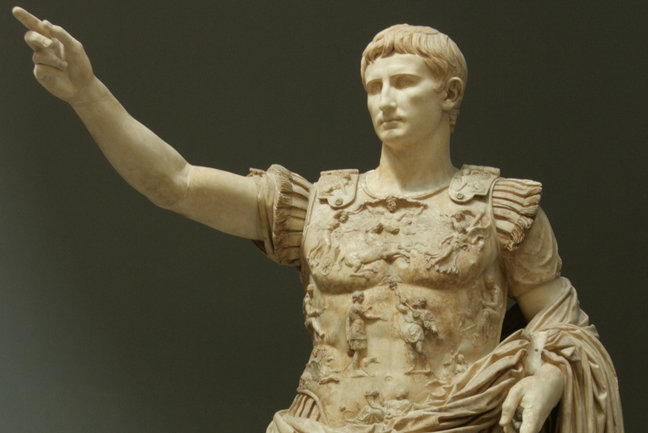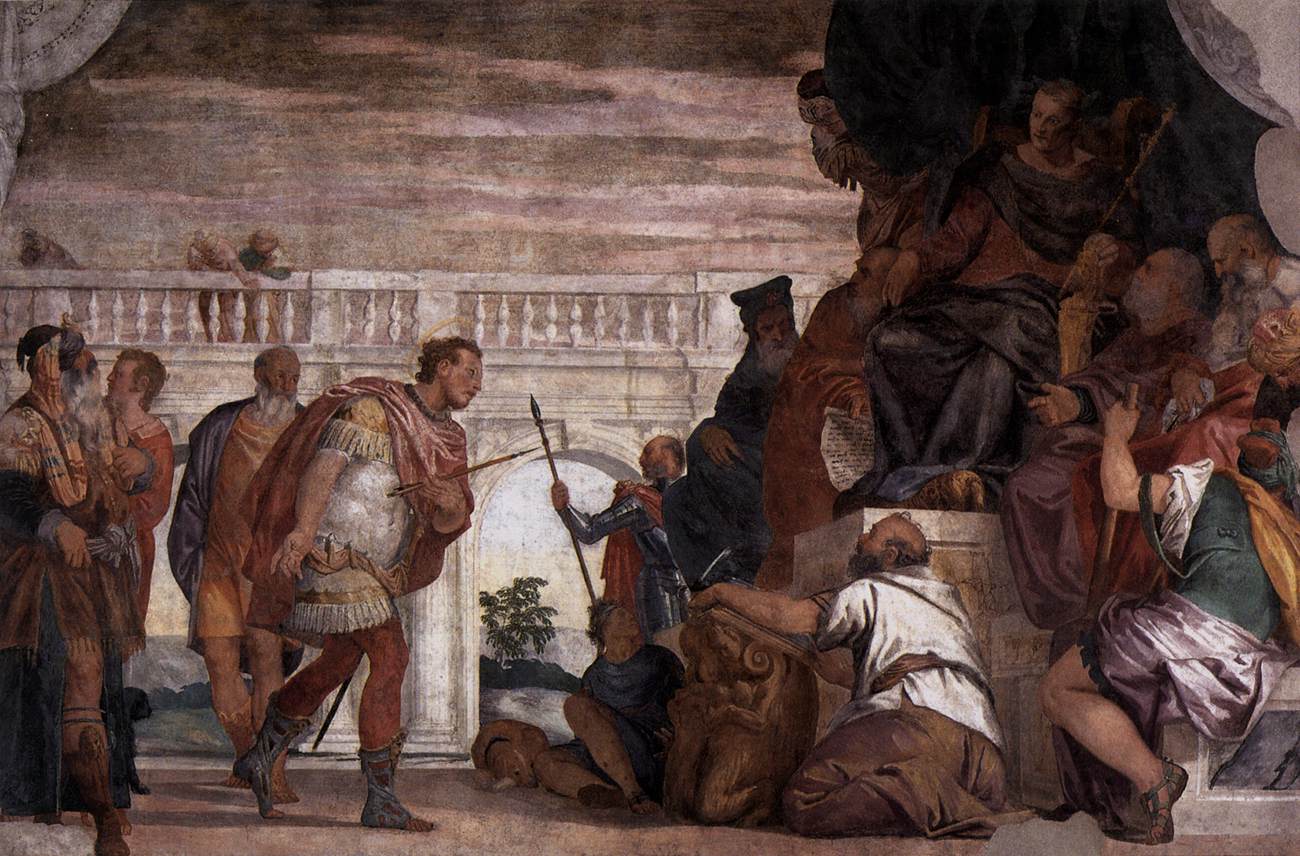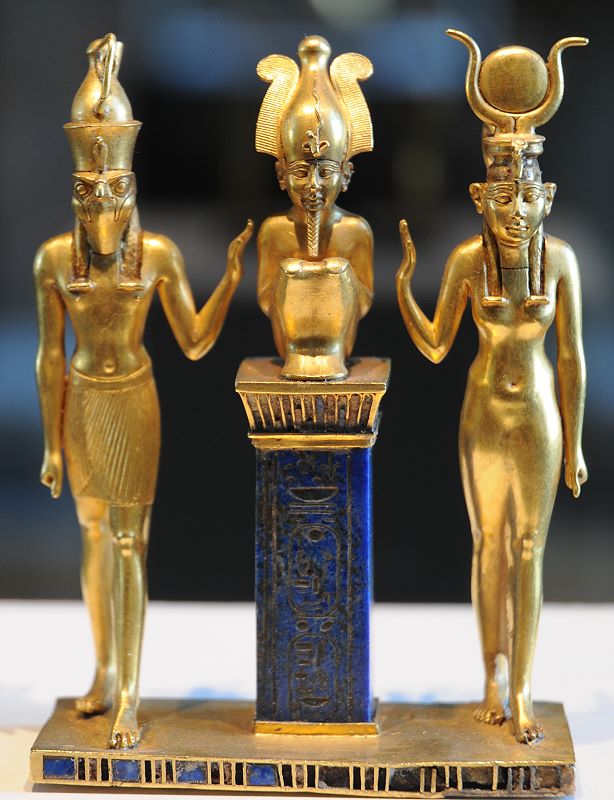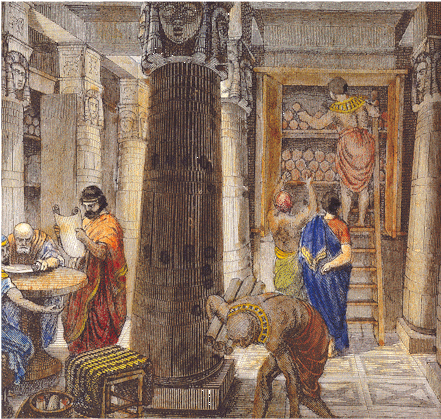Historical Eras

Alexandria at the Roman Era

On his first entry to the city, Emperor Augustus (30-13 B.C.) used a very wise policy as he entered Alexandria as a conqueror. He declared a general amnesty for all Alexandrians and Egyptians, did not take revenge of anyone, contrary to the ancient tradition when opening an opposing city, and refrained from allowing his soldiers to loot the city. to gain their sympathy and safeguard from any revenge from their side. Plutarch, the historian, says that Caesar Augustus walked to the city holding his right arm to bestow honour and tells of the long march of the Emperor in the city, hand in hand with Arius the philosopher in a show of confidence and respect from the citizens. He then entered the gymnasium (an institution for the education of citizens) and sat at the top of the podium.
Half-deified, he was worshiped by the people who bowed before him, but he ordered them to rise to their feet and declared his general amnesty for various reasons, firstly, for the sake of Alexander the Great – founder of the City of Alexandria, secondly for his admiration at the beauty of the City, and thirdly in appreciation for his master and friend – Arius. It is claimed that he delivered his speech in Greek to enable his audience to understand him.
- Augustus Emperor revoked the Alexandrian House of Commons and ordered the City to be ruled by the Alexandrians themselves.
- As for the executive authority, represented by the appointed rulers of the City, the Ptolemaic era system continued unchanged. The positions were held as a prestigious post, and never paid. In fact, only citizens who were rich enough to spend on the job were appointed to these posts.
- The Roman sovereignity and dominion imposed by Augustus on Egypt had caused Alexandria to lose its sovereignity and significance. Alexandrians were not satisfied with their new situation to beging with, but they were unable to rebel either publicaly or directly against the Roman rule.
- Therefore, Alexandrians resorted to two outlets for their repressed rage; firing jokes about their rulers and ridiculing them, and lashing out at those who support the rulers and have empathy for them.
- At the end of the second century, the political conflict grew in Rome and Alexandria started to announce its indignation at the Emperor by supporting his opponenets. The last rebel against the Emperor, into which Alexandrians took part, was started by a Roman officer in the city against Diocletian, who had to go to Alexandria in person to put down the revolt causing a lot of damage and destruction to the city.
The City System

Social Life
As a Greek city founded by Alexander the Great and later ruled by the Ptolemies and the Romans, Alexandria was populated by the Greeks who were its main citizens, followed by others who were deemed worthy of enjoying its citizenship.
Under Roman rule, Alexandrian citizenship was a privilege only granted by the Emperor himself.
For a long time, Alexandrians represented the elite of the Egyptian society and many villagers and rural dwellers flocked to Alexandria in search for special privileges and evade the heavy taxes otherwise imposed on them.

Religion Life
Worship of the Alexandrian trinity of Serapis, Isis and Hour persisted. In addition to this formal trinity, worship of Roman Emperors replaced the worship of the Ptolemies.
Further, a worship of Roman Emperors emerged as a public worship taking place on public celebrations but not in households. Various religious cults also existed under the rule of the Greek Empire.
Economic Life
If the Ptolemy adopted an approach of masterplanning and monopoly of most exonomic activities by the state, the Romans had a reverse approach; a free economy in many fields to revive the state's economy.
It is worthnoting that the economic status of Alexandrians flourished immensely due to foreign trade. Alexandrians turned part of their wealth into the ownership of farms. In such circumstances, major iqta'as, largely known as "Al Wesiya" in the history of Egypt's agriculture during the first century of the Roman rule, started to emerge.
In terms of the industrial and commercial life, Alexandria was regarded as the largest centre for industry and trade, not only in Egypt, but across the entire Roman Empire.
The glass, papyrus and textiles industries became quite popular, in addition to other small industries including jewelery making, perfumes, and fine crafts, e.g. metal sheet works, among others, whose materials were imported from Africa and Asia to be manufactured in Alexandria.
Alexandrians used their naval fleets in the Meditterranian and the Red Sea. In the Meditterranian, they had the first trading fleet, whereas in the Red Sea, Alexandria completely monopolized the trade to the East upto India.

Culture Life
Romans favored both cultural and scientific institutions in Alexandria as evidenced by the famous Alexandria Library, the House of Wisdom, schools and auditoriums, which attracted many students from within Alexandria and from afar as well. Further, scientists and researchers were granted many exclusive privileges and tax exemptions.
Among the most eminent scientists of that era was Ptolemy the geographer who also excelled in mathematics, astronomy and physics. He had laid out a map of the world on which countries and cities were drawn at very precise scales.

